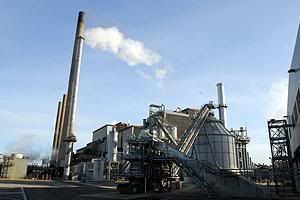UK opens first large scale 30MW biomass power station
 Sembcorp Industries (Sembcorp) has officially opened the UK's first large scale biomass power plant. The 30MW station is the first to produce renewable energy using naturally sustainable biomass without any input of fossil fuels. UK Energy Minister Malcolm Wicks, who oversees energy policy in the UK including sustainability and the environment, presided over the opening ceremony for the £64 million (€90.7/$132.5 million) biomass power station located at the Wilton International manufacturing site in Teesside in the Northeast of England.
Sembcorp Industries (Sembcorp) has officially opened the UK's first large scale biomass power plant. The 30MW station is the first to produce renewable energy using naturally sustainable biomass without any input of fossil fuels. UK Energy Minister Malcolm Wicks, who oversees energy policy in the UK including sustainability and the environment, presided over the opening ceremony for the £64 million (€90.7/$132.5 million) biomass power station located at the Wilton International manufacturing site in Teesside in the Northeast of England.The opening strengthens Sembcorp’s position as a first mover in green energy, as it is the first Singapore company to own and operate a biomass power plant in the UK. The plant is itself also the UK’s first large scale wood burning power station, and will use 300,000 tonnes of sustainably harvested biomass a year to generate 30 MW of electricity – enough to power 30,000 households. Moreover, the plant is the UK’s first power plant entirely fuelled by a renewable energy source, without any inputs of fossil fuels.
The biomass for the power station comes from four separate sources:
- Recycled wood (80,000 tonnes) - this is received, stored and chipped at the UK Wood Recycling site at Wilton
- Sawmills (80,000 tonnes) – the wood comes to the site already chipped as offcuts from sawmills
- Managed forests (880,000 tonnes) - Sembcorp is working with the Forestry Commission of Great Britain and leading forestry company UPM Tilhill to utilise small roundwood logs from north east forests – items sometimes left on forestry floor after normal tree felling operations
- Specially grown energy crops (55,000 tonnes) - Sembcorp is working with farmers and other landowners locally for the supply of energy crops, specifically a type of willow known as short rotation coppice. The plant would eventually require the growth of around 7,500 acres (2830 ha) of coppice in the region.
With the plant, Sembcorp will save an estimated 200,000 tonnes of carbon dioxide emissions a year compared with a conventional power station – the equivalent in greenhouse gas reduction terms of taking 67,000 cars off the road. The plant’s operations will also be classed as carbon neutral and will hence avail Sembcorp of unused carbon allowances to trade as carbon credits:
 energy :: sustainability :: biomass :: bioenergy :: biofuels :: climate change :: forests :: recycling :: wood :: energy crops :: UK ::
energy :: sustainability :: biomass :: bioenergy :: biofuels :: climate change :: forests :: recycling :: wood :: energy crops :: UK :: In addition to carbon credits, Sembcorp’s biomass power plant is also set to generate a fresh stream of revenue for Sembcorp from the power sold, as well as from Renewable Obligation Certificates (ROC’s) and Levy Exemption Certificates (LEC’s).
This new biomass power plant strengthens our capabilities in producing power using different fuels. With this plant, Sembcorp now has 3,382 MW of power worldwide in operation and in development. This investment is also in line with Sembcorp’s push to provide innovative solutions to serve our customers’ utilities needs, while delivering value to our shareholders. - Tang Kin Fei, Sembcorp’s Group President and CEOSembcorp’s intention to build the UK’s first 100 per cent wood-to-energy power station was formally announced in March 2005. Work on the station began later that year and following commissioning, full commercial production has commenced.
The electricity generated by the plant is being sold to E.ON – the UK’s largest integrated energy company.
References:
Sembcorp Industries: UK Energy Minister opens Sembcorp's new woodburning power station - November 12, 2007.
 --------------
--------------
 The Intergovernmental Panel on Climate Change (IPCC) kicks off the meeting in Valencia, Spain, which will result in the production of the Synthesis Report on climate change. The report will summarize the core findings of the three volumes published earlier by the separate working groups.
The Intergovernmental Panel on Climate Change (IPCC) kicks off the meeting in Valencia, Spain, which will result in the production of the Synthesis Report on climate change. The report will summarize the core findings of the three volumes published earlier by the separate working groups.








0 Comments:
Post a Comment
Links to this post:
Create a Link
<< Home